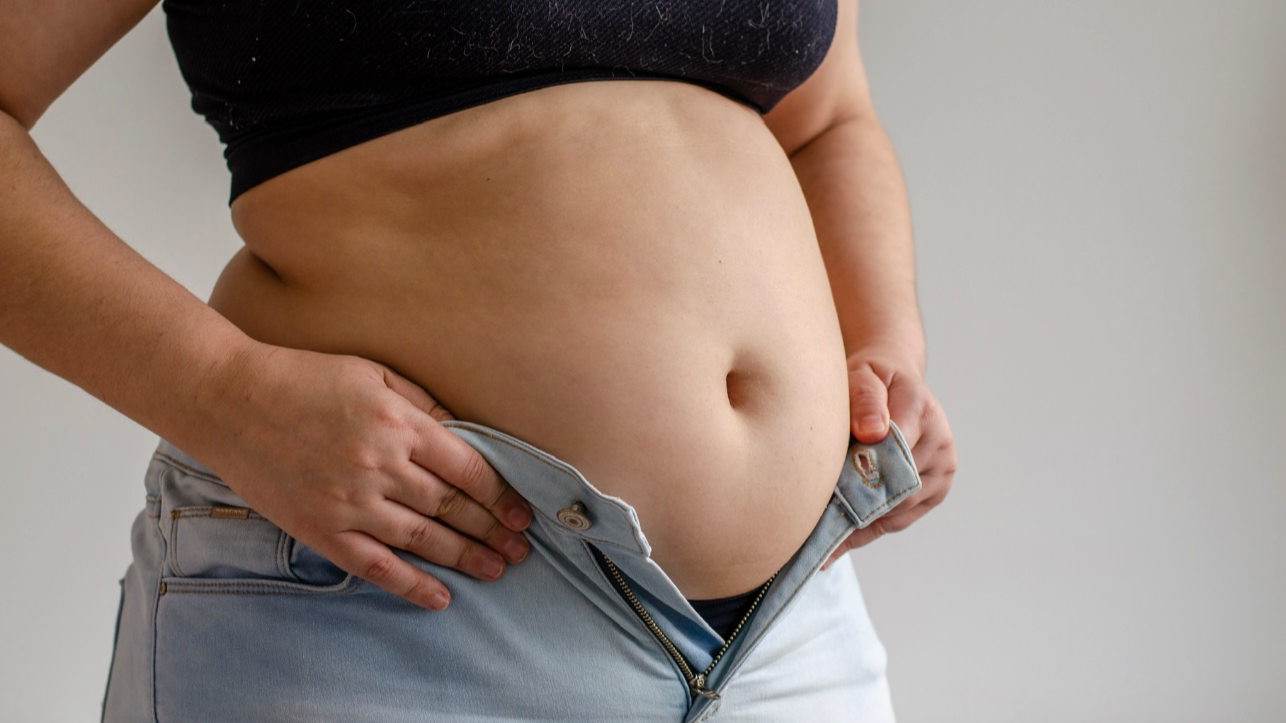Menopause Belly Bloat: What’s Normal, What’s Not & What Can Help
You wake up feeling fine, but by 3 p.m., your jeans are cutting into your waist, your stomach is tight, and you swear you look five months pregnant. Sound familiar?
Welcome to menopause bloat — the kind no salad swap or detox tea can fix.
If you’re in your 40s or 50s and wondering why your midsection feels out of control, you’re not alone. Belly bloat during menopause is real, hormonal, and treatable — but only if you know what’s actually going on.
Why Menopause Causes Bloating
1. Estrogen Fluctuations
Estrogen affects fluid retention, digestion, and how your body stores fat. As estrogen rises and falls, your digestion slows and your gut becomes more sensitive.
Result? Water retention, constipation, and gas.
2. Lower Progesterone
Progesterone is a natural diuretic. When it drops (hello, perimenopause), your body holds onto more water — especially in the belly.
Lower progesterone also means less gut motility, which causes that heavy, full feeling.
What’s Normal vs. What’s Not
✅ Normal Menopause Bloat:
• Comes and goes during the day
• Worsens with certain foods or stress
• Linked to cycle changes, if still menstruating
• Improves with diet tweaks, sleep, and hydration
🚩 When to See a Doctor:
• Persistent bloat that doesn’t go away
• Painful, hard belly
• Rapid weight gain
• Digestive issues with blood, diarrhea, or vomiting
• Bloat that worsens at night and disturbs sleep
Trust your gut — literally. If something feels off, get checked.
What Makes Bloating Worse in Menopause
• Ultra-processed foods (chips, baked goods, deli meats)
• Carbonated drinks (yes, even sparkling water)
• Too little fiber OR too much fiber too fast
• Eating too fast or skipping meals
• Sitting all day
• Stress and anxiety (tightens the gut)
What Actually Helps (Without Fad Diets)
💧 1. Hydration First
Bloating is often water retention — not lack of water.
Drink:
• Filtered water throughout the day
• Herbal teas like fennel, ginger, dandelion, or peppermint
• Warm lemon water in the morning
Avoid guzzling large amounts during meals — sip slowly instead.
🥗 2. Easy-on-the-Gut Foods
Eat foods that are:
• Lightly cooked (vs. raw)
• Low FODMAP (if sensitive)
• Anti-inflammatory (like turmeric, ginger, leafy greens)
• Rich in potassium (avocado, banana, sweet potato)
Avoid bloat-triggers like:
• Onions, garlic (if sensitive)
• Beans and lentils (unless soaked/sprouted)
• Artificial sweeteners
🧘🏽♀️ 3. Move That Belly
Even light movement can stimulate digestion and reduce bloat.
Try:
• Walking after meals
• Gentle yoga or stretching
• Rebounding (mini trampoline)
• Belly massage with circular motions
Bloating = stagnation. Get things flowing.
💩 4. Support Regular Bowel Movements
Constipation = bloating. The end.
Support your gut with:
• Magnesium citrate or glycinate
• Psyllium husk or chia (with lots of water)
• Prunes, soaked flaxseed, warm herbal teas
• A consistent bathroom routine
🌿 5. Try Herbal & Supplement Support
• Digestive bitters before meals
• Probiotics for gut balance
• Adaptogens like ashwagandha or maca
• Milk thistle or dandelion for liver support
Always consult your healthcare provider before starting new supplements.
🛌 6. Reduce Cortisol (aka The Belly Fat Hormone)
Chronic stress = high cortisol = more belly bloat and fat.
Combat it with:
• Better sleep
• Deep breathing
• Saying no more often
• Reducing screen time before bed
• Less caffeine, more connection
This isn’t fluff — it’s hormonal science.
Belly Bloat vs. Belly Fat: Know the Difference
Bloat is temporary, uncomfortable, and can fluctuate daily.
Belly fat is persistent, deeper (visceral), and connected to long-term hormone shifts.
The fix for both? Gentle, long-term nourishment — not restriction.
Final Thoughts
Menopause belly bloat isn’t a vanity issue. It’s a hormonal signal that your body needs care, rhythm, and respect.
Stop blaming yourself. Stop fighting your body.
And start supporting the systems that are asking for attention.
You’re not inflamed. You’re transforming. Support that transformation with food, rest, and wisdom — not shame.










